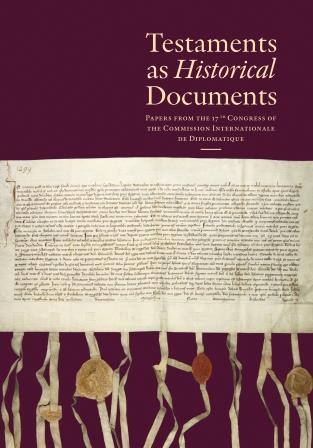| |
Pris: 560 SEK exkl. moms  |  What happens to the property of a deceased person? Who has the right to inheritance, and under which conditions? Who stipulates inheritance rights? These questions are as relevant nowadays as they were in the Middle Ages when the custom of making last wills spread all over the Latin West. Although the practice of making testaments became universal, forms and procedures varied considerably over time and in different regions. What happens to the property of a deceased person? Who has the right to inheritance, and under which conditions? Who stipulates inheritance rights? These questions are as relevant nowadays as they were in the Middle Ages when the custom of making last wills spread all over the Latin West. Although the practice of making testaments became universal, forms and procedures varied considerably over time and in different regions.
The twenty-seven articles in this volume present and analyse medieval wills from various points of view. Geographically, the volume covers a large area, from Southern Europe to Scandinavia, from Ireland in the West to Eastern Europe. The contributions reveal changes over time and space and accentuate different regional patterns and particularities: the degree of orality or literacy, the social status of testators, urban versus rural, and much else. The volume also suggests the potential of testaments as historical sources for studies on ownership, social networks, legal practices, and economic resources.
CONTENTS:
Claes Gejrot, Kurt Villads Jensen, Kirsi Salonen & Benoît-Michel Tock
Preface
Mark Mersiowsky
Late MedievalWills in Southwest German Imperial Towns (1250–1500)
Anja Thaller
Testaments of Noblewomen in the Holy Roman Empire (13th–15th Centuries)
Reinhard Härtel
Last Wills in the Border Area of the Roman, Germanic, and Slavic Worlds (9th–13th Centuries)
Karl Borchardt
Testamenta religiosorum – Illegal Charters?
Peter Erhart
“As it is certain that you will come to death” – Last Wills before Leaving for Rome
Anders Leegaard Knudsen
Women as Issuers of Testaments in Medieval Denmark
Kirsi Salonen
Papal Administration and the Rights of Clergymen to Make a LastWill in the Medieval Diocese of Turku
Cristina Mantegna
“Volo et instituto”: A Journey through the Dispositions in Northern ItalianWills from the Early Middle Ages
Marta Calleri & Marta LuiginaMangini
The Forms and Functions of Notaries’Wills in Central and Northern Italy (13th–15th Centuries)
Francesca Macino
The Will of the Testator and the clausula “rebus sic stantibus” in the Late Medieval and Early Modern Period: A Path between Doctrine and Practice
Saul António Gomes
The Wills of the Kings of Portugal between the 12th and 14th Centuries
Maria João Oliveira e Silva
The Formularies of Medieval Portuguese Testaments through the Study of a Monastic Archive
Maria Helena da Cruz Coelho & Maria do Rosário Morujão
Wills and Testamentary Executors in Medieval Portugal
Marie Bláhová
Testaments in Přemyslid Bohemia
Annika Björklund
Servants in Medieval Swedish Testaments
Janken Myrdal
Testaments as a Source for Everyday Life
Olivier Canteaut
Facing Death at the Royal Chancery. A Comparative Approach to the Testaments of French and English Kings (Late 12th – Late 15th Centuries)
Miguel Calleja-Puerta
Wills from the Cathedral Archives of León and Castile, c. 1150 – c. 1250
Huw Pryce
Oral Bequests and Written Wills in Medieval Wales
Thérèse de Hemptinne & Els de Paermentier
Testamentary Practices at the Comital Court in Flanders and Hainaut during the Long Thirteenth Century
Mª Milagros Cárcel Ortí
The Will of Jaspert de Botonach, Bishop of Valencia (1276–1288)
Diego Belmonte Fernández
Lords Spiritual and Temporal: Testaments in the Crown of Castile, Fourteenth to Fifteenth Centuries
Ricardo Seabra
Notarial LastWills and Testaments from Medieval Porto (13th to 15th Centuries): A Diplomatics Approach
Maria Cristina Cunha
Some Remarks on LastWills at Guimarães (Portugal) in the 13th and 14th Centuries
María Josefa Sanz Fuentes & Guillermo Fernández Ortiz
Asturian Wills during the Thirteenth and Fourteenth Centuries: Tradition and Renewal
Daniel Piñol-Alabart
Clauses, Formulas, and Texts in Catalan Testaments from the Twelfth to the Fifteenth Centuries
María Luisa Domínguez-Guerrero
Sorting the Deceased’s Assets in the Spanish Colonies (c. 1550)
Benoît-Michel Tock & Kurt Villads Jensen
Conclusions | | |
|